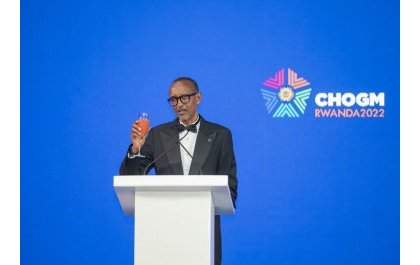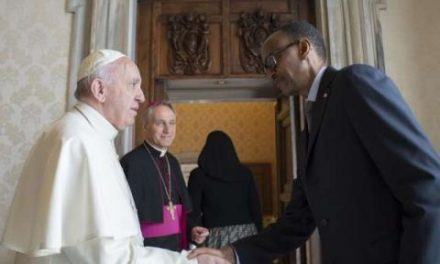Kigali: On July 26, the High Media Council released a list of 42 media allowed to operate in Rwanda. It touched off a storm of criticism that it was silencing critical media as the country heads to the presidential poll on Monday. In the same week, Newsline – a sister paper to suspended UMUSESO – was confiscated by Police at the border from Uganda on the recommendation of the Council. RNA put these concerns to the Council’s Executive Secretary Patrice Mulama.
 You recently released a list of 42 media outlets allowed to operate in Rwanda. Is this the end of the story? What is the fate of others not on this list?
You recently released a list of 42 media outlets allowed to operate in Rwanda. Is this the end of the story? What is the fate of others not on this list?
We had that number at the beginning of last week but by now the numbers have grown. No sooner had we published the first list of media organizations that were compliant with the current media law (August 2009), than the other followed suit immediately. Now, all the radio stations have complied. Around four or five newspapers have complied. As we talk, the number is no longer 42, it has increased to 47 plus.
Everybody is wondering what the necessity of this whole exercise was.
The law! It is rule of law whenever a new law comes in force. The 2002 law required media organs that existed to show to the Ministry of Information –which was in charge by then – that they conformed to the provisions of the law that came into force then. When that law was amended [to] a new law of 17 August 2009, it required media organizations which were in existence before its promulgation, to declare to the Media High Council that they conform to the provisions of Article 24 of this law. The Article details the requirements for any media organization to be licensed or legally constituted in Rwanda. All these media had what we were asking from them. It was just putting them together [and] take them to the Media High Council – not to register, but to declare to [Council] that they conform.
The law is clear. Article 96 says [media organisations] will have declared to the [Council] that they conform to the provisions of this law. Article 95 says they will within a period not exceeding three months, as required under Article 24. However, as for the capital, it shall be 24 months. Meaning that before August 2011, all [media] that were in existence before coming into force of this law, will also have declared to the [Council] that they have the minimum capital – which is a requirement for any [media] to be operational. This law provides a transition for capital requirement of two years, and level of education for journalists – which is five years. If the law says that, why should we do the opposite?

Mulama says UMUSESO and UMUVUGIZI can return and submit their documents after their six-month suspension which started in April
Almost everybody keeps thinking this law is targeting a certain group of media, for example UMUSESO, UMUVUGIZI.
If it was targeting those newspapers, the [Council] would not have suspended them. We would have waited for this time to come around. This would have been very simple to tell them go and start afresh. There is no link whatsoever between this issue of conforming to the new law and any newspaper or media that has failed to conform. UMUSESO and UMUVUGIZI were supposed to come and furnish us with the requirements if they were interested because they still have the right. They have not been banned, they were just suspended.
So the two can come and submit their documents…
There is nothing wrong with that! This is normal for every media. I have been explaining this day-in-day-out. People are saying the…‘papers have been suspended’…NO! There hasn’t been any suspension of any media organization. We have only put forward a list of organisations that have conformed to the provisions of the new law. And because the law also provides for sanctions on [media] that do not conform, we have also indicated that if they [publish] before they conform, they will be subjecting themselves to sanctions. We have again left everything open.
Go ask Voice of Africa (Islamic), Radio Sana why they did take that long. And then ask them: why did it take you just one day to conform and you only did that two days after the Media High Council had made public the list. Do not stop there: ask UMUSEKE newspaper – which also just conformed today (August 04). Ask Rushyashya, Gasabo, Ingenzi – which have conformed.
Actually the media that have turned up to conform since we published the list, is much bigger than the number we received for the past one year when we were begging these people to meet the provisions of the law.
What happened to Voice of America (VOA)?
VOA conformed [August 03]. They sent us their requirements. This is a company that is as big as an industry. It is not the size of some of our small things that you talk about here. Here when you [are] talking [about] media, with the exception of The New Times and a few others most of the rest are just individuals. It is the individual asking themselves to conform to the law. But for a company like BBC or VOA, it goes through a process. That said, that should not be a justification for them not to have complied in time or on time, because BBC was able to do it on time. I think internally, they did not think it was serious that they needed to do it as first as possible. When [they] heard we had run a list, and that the law punishes those that do not, everybody was too quick to conform.
How come this happened just before the elections? Surely this is not a coincidence.
It is a coincidence! It has no relationship at all with the elections. The law was published last year in August. Three months which is provided by the law was supposed to expire in November 17. We waited, nobody responded. We thought probably it might be ignorance of the law, and Media High Council was also busy trying to conform to the provisions of the new law. We had to restructure as a result of the Media High Council law. We wrote to all [media] in December reminding them that they had a deadline, giving them one month. Some kept coming here saying this is too fast. So we organised a meeting on January 28 to review the contents of this whole law, not only Article 24.
Everybody was there, and they said they need more three months to look for the documents. We said ‘NO’. Their argument was that they were not aware about the timelines. Ignorance of the law is no defense. But they pleaded and we accepted.
By May, some had not complied still because they were missing different documents. We issued a new deadline [through] announcements in newspapers, and on radios. You are asking that why has this issue [requiring media to declare] come now, it took a long process and it came a point where you would see people are just adamant they don’t want to abide by the provisions of the law, yet we are in a country that wants to be recognized as abiding by the rule of law. If we claim to be a country of the law, then everybody – including the media – must abide.
We gave them another deadline July 05 during which a number of them complied. On July 09, we had a press conference to make known those that had complied. We showed the radios and newspapers that were conforming, and also showed them those that were not. They pleaded that ‘please give us one more week’ – which was July 16, and we notified them that we will make known those that have complied. We told them those that will have not complied; the law would take its course. This is what we did on July 26 incorporating those that had come in on that same day. After this deadline, we continued to receive files.
There is no way anybody, at any one moment, should link this to elections! Unless if you are saying there should not be any decisions taken during election period! These are legal and administrative decisions. Should there be a period when a country is ruled by the law but the rules don’t apply? I don’t think so!
But Reporters Without Borders (RSF) says you have suspended more than 30 newspapers.
I was looking at the report of RSF. It is completely baseless. It is completely misinformed. That more 30 media organisations have been suspended? I have the list here. I want to go through this list, and you tell me which one of these newspapers has appeared on the street in the last one year and before. Since 1994, newspapers have been born and died. Some came when there was nobody to register them. There was a time when they were required to register with the Prosecutor General’s office; then the Ministry of Information; then the Ministry of Local Government.
When we talk about the numbers, we have that whole list registered by these [offices]. But a number of these have since died. Some have never appeared on the market.
URUMURI for Frank Tanganika is dead. He left it [to study] for a PhD, which took [him] like three or four years. Frank is not complaining as he is no longer interested URUMURI.
The Newsline entered into the country and was blocked at the border. What explains that? Are they not allowed in Rwanda?
I have no idea about their publication in Uganda or anywhere. Probably what I know is the reason given by the Police for the interception. This was a paper that was not on the list which we gave to the Police. Newsline was not in conformity with the provisions of the new law. More than 90 percent that are in this category of non-existing newspapers have not been publishing for the last three years-plus. [For instance] These guys of Rwanda Dispatch came here pleading for different things, but have not returned ever since. I am actually going to call him. UMURINZI has no editor, so it could not be allowed.
What about Business Daily of Marcel Museminali?
Business Daily is missing two quick things: Certificate of Incorporation and an editor. This is the paper whose owner has been shouting. He is just feeding everybody on rumours. He claims he is going to court. I have challenged and dared him. Please, let him got to court. We will see who is conforming and who is not. If he surely believes in what he has been telling people, let him go to court – then we will see. Ask him for a Certificate of Incorporation, editor, director, which are the missing elements in his dossier. We cannot at any one moment declare anybody compliant because they have been shouting.
What is wrong with UMURABYO?
UMURABYO’s owner is in jail. She is charged on various charges. You don’t expect this newspaper to come out because the owner has been everything. Just like most of these you see on this list of papers that have not been running on the streets, and a couple of others that have declared, they are what is called in commerce sole proprietorship. You will find the owner is in charge of everything: he is everywhere; in charge of marketing; accounting; finances; circulations; editor; director; and is the office – in that where he is not, the office is not, or where the paper, he is not.
That is the type of newspapers that everybody is shouting that they have been suspended and therefore heaven has come on earth. It is not a very correct impression of Rwanda. Reporters With Borders – and a couple of other people, have reasons why they say [that].
When people talk about these newspapers, you can think they are like the Daily Telegraph, or New York Times, or Washington Post – which have up to 1000 people. They are not! These are just one-man-show papers. We have been following these papers. They publish nothing other than content that violates the law.
http://www.rnanews.com/politics/3968-no-newspaper-was-banned-rsf-is-misinformed–media-council-
Posted by rwandanews.be




